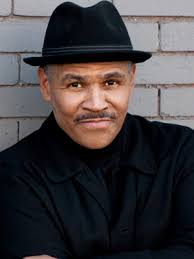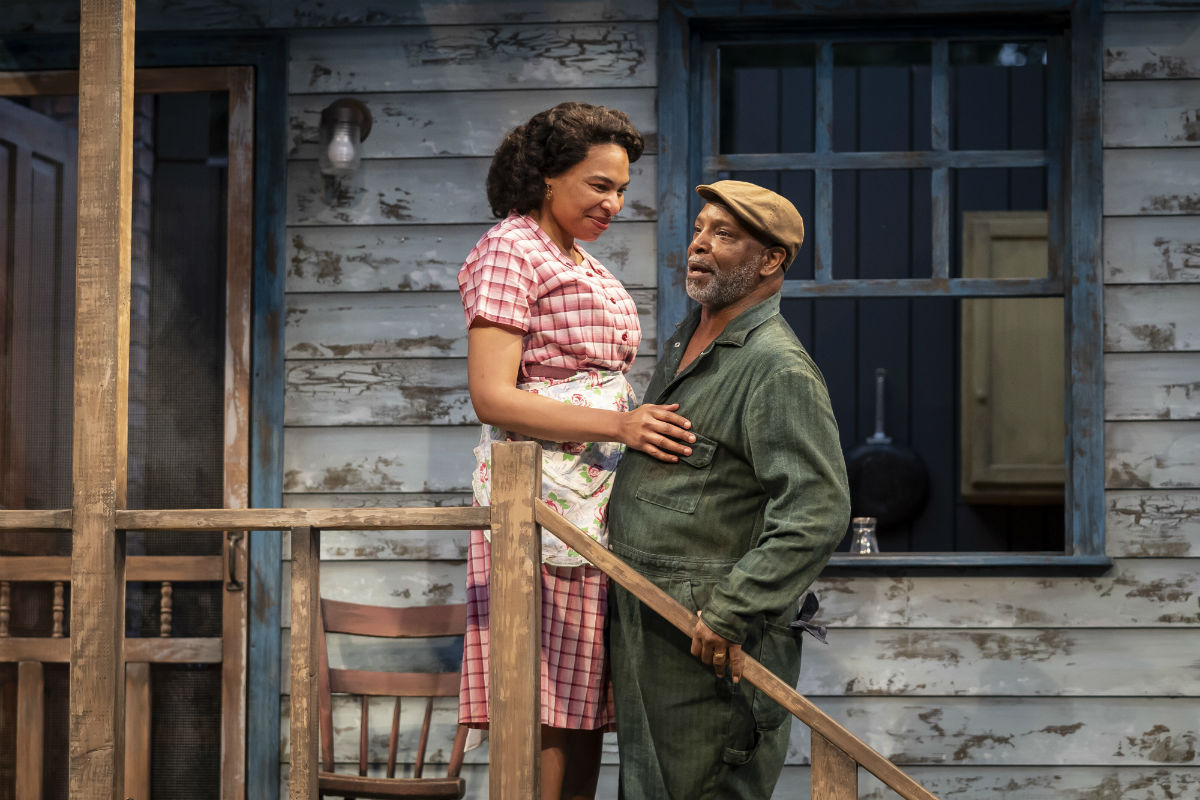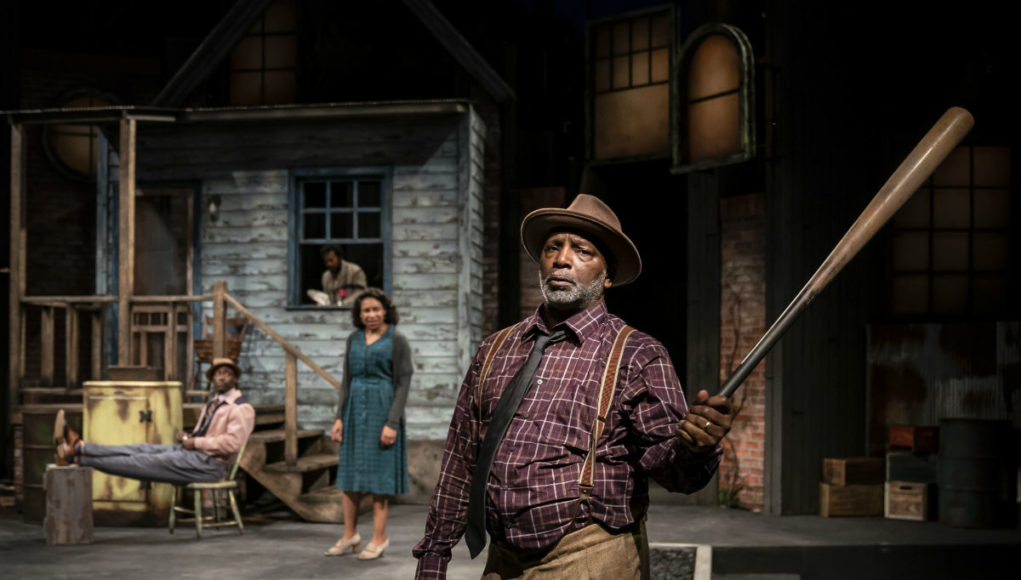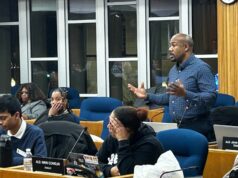Ron OJ Parson has some things in common with Troy Maxson.
Troy, the central character in August Wilson’s seminal play Fences, carries a deep-seated heartache from never being able to play big-league baseball, despite being the home run king of the Negro Leagues.
Parson didn’t make the big leagues either, but not because baseball was segregated — rather, he got sidetracked into a decades-long career in theater.
Still, Parson tells Madison365 that he’ll bring his athletic sensibilities to bear as he directs the American Players Theater production of Fences, opening this weekend and running through September at APT’s Hill Theater in Spring Green.

“Because I was an athlete, I kind of have an affinity for Troy’s character, so I do like to instill that sport aspect of it,” he says. “The athleticism and the sports aspect of it is very important to me, but also life and history. People say, ‘Well, (Fences) is not about racism,’ and this and that. Well, yes it is. Troy is a bitter guy because of that,” noting racism is the only thing that kept the fictional Troy and many real Black athletes from playing major-league professional sports.
Parson grew up as an athlete and went to the University of Michigan in 1971 as a walk-on for both football and baseball, beginning as a journalism major. He’d been acting as a hobby since the third grade, though, and happened to be walking through the theater building one day.
“I heard them rehearsing a play called Day of Absense, which is a play that I knew because the Negro Ensemble Company came to my junior high school,” he recalls. “When I heard it, I said, ‘I’m going to go in there and see what’s going on.’ This guy named James Simmons was teaching at the University of Michigan, invited me to join him and I came in and ended up playing a part in the play. I just realized I had been acting and directing since I was a teenager, so I said, ‘I think I’m going to try this.’”
Over the course of the next 40-plus years, Parson has acted on stage and television, founded a theater company in Chicago, and directed countless productions — including nine of the 10 plays in August Wilson’s iconic Pittsburgh Cycle. The Cycle documents the African American experience through the Twentieth Century, with one play set in each decade from 1900 to 1999. Parson will complete the cycle when he directs King Hedley the Second at the Court Theater in Chicago this fall.
Fences is the entry in the cycle that represents the 1950s.
Parson first directed a production of Fences back in 2005, and hopes to bring to this production a lot of what he’s learned since then.
“I think what I bring to it in general, and this one in particular because I’m an older guy now, is just the history of it. It’s got a rich history,” he says. “(I bring to it) my experience with the language and the depth of characters. I do feel like it’s such a rich, rich canvas for any actor to be able to take those words and find the music in the play, which I look for that all the time. I do try to maintain the poetry of August’s language.”
One of the actors who’ll bring that language to life in the role of Troy is David Alan Anderson, who’s also got some experience with the script, having played Troy several times across the country, including at Milwaukee Repertory Theater. He’s also acted in eight of the 10 plays of the Pittsburgh Cycle.

“I think it brings a different level of trust in the material, understanding of the character, and it also kinda helps to solidify the understanding, the connection with the character,” Anderson says. “You find similarities in characters and sometimes have a tough time connecting with those similarities. Sometimes you learn things about yourself through the characters and then sometimes you have to live with what you learned, and then sometimes they create different challenges for you. And it kind of helps ground the character because I’ve been so familiar with him.”
The cast also includes longtime Chicago stage actor Karen Aldridge as Rose Maxson as well as Bryant Louis Bentley, Yao Dogbe, Jamal James and Gavin Lawrence.
Even though they’re both steeped in this script and these characters, Anderson and Parson both look to find something new this time around, especially since it’s the first time they’ve worked on this play together.
“It’s always new and slightly different when you work with different actors, different directors,” Anderson says. “And I think in this particular instance, there are a few places where the director’s requested a different sort of nuance to a moment, a different challenge in a different way to interpret a particular moment. The challenge (is) trying to set aside what you’ve already done with what you know about the character, and what you feel works, and then to try and push that aside and try and revisit a moment differently at the end. And I feel like I’ve done that.”
Both Parson and Anderson say performing a seminal Black play in front of an audience that will be mostly white is nothing new.
“It usually is that way,” Parson says. “It’s usually a 90 percent split, maybe even more … It’s a good play for that because of the universality of the story, father, son, wife, that is supportive of her husband and loving her son. All those things are basic storytelling issues that can be any culture. But then you add the specificity of this particular culture in the 50s, and that adds the other element to it.”
Anderson isn’t concerned that some members of that audience might have Denzel Washington’s Oscar-nominated performance in the 2017 film in their minds when they come to APT. Parson, for his part, thinks the mass-market film adaptation helped get more people familiar with Wilson and his work, and that’s only a good thing.
“I think it’s good to show people this movie but to use the history of it so you find out, ‘Oh, this was a play,’ and then you go read the play, and then you read about the author and then you see some other play that he’s done and you go see that,” Parson says. He also notes that Wilson remains one of the most-performed playwrights ever.
“I don’t know any other writer but Shakespeare that has 10 (or more) plays, (and) one of them is being done somewhere all over the world every day,” he says. “Ten plays that get done constantly. Granted, you got (Tennessee) Williams, you got (Eugene) O’Neil, but there’s a few of their plays that get done all the time. This guy has 10 plays.”
Parson says he doesn’t have specific expectations for what an audience will take away from the production.
“I don’t really have an idea except if they find the story universal or something that they can relate to, even if from a different culture, to be able to relate to this story,” he says. “I expect them to get out of it what it means to them, how it resonates with them. Some women might look at Rose. Some women might look at their son, like Cory, the husband that they may have gone through things with. Some of the young people might look at Cory’s character, wanting to be as good as his dad, or his dad wasn’t in his life, and things like that. I don’t like to pin down, ‘I hope they get this out of this.’ For one thing, I just hope they enjoy it and I hope they leave the theater talking about the play and not where they’re going to dinner. That happens a lot. If you go in the lobby and you hear people talking, ‘Well, I think Cory should’ve done this, done that.’ That to me is what it’s all about, when people are moved by it enough to continue discussion at home.”
Anderson says he just wants the audience — black, white or other — to get lost in the Maxson’s backyard.
“That brings an interesting dynamic when you consider that (in) the audience … you become part of the show, in a sense,” Anderson says. “You become a people who are kind of sitting in the backyard with Troy and his family. There’s a different challenge because they view and approach and perceive what’s happening in a different way than I do, than maybe a black audience would. But yet they still feel it. They still become a part of it. They still find a way to connect to something or someone in the play. So, you don’t do it for white audiences. You don’t do it for them. If there were a black audience, you don’t do it for them. You just do the play. You try to tell the truth. And either way, as an audience, your responsibility is to come and participate, to lean in and listen and be a part of it.”
Fences opens Saturday, August 10 and runs through September 28, in rotating repertory with the other plays on American Players Theater’s 2019 season: She Stoops to Conquer, MacBeth, Twelfth Night, The Book of Will, The Man of Destiny, A Lovely Sunday for Creve Couer, And A Doll’s House (Parts 1 and 2). Tickets are $65 and $76, or $32.50 and $38 for student rush seats.


































